How to Engage Managers: 10 Proven Strategies to Boost Leadership Involvement
Managers shape employee engagement, yet many are disengaged themselves. Learn 10 practical strategies for engaging managers to build stronger, high-performing teams.
On this page
Employee engagement is a hot topic in the business world today - and no wonder because highly engaged employees benefit your business. But in all the discussions about the best ways to engage employees, one very important group is left out: managers.
According to one Gallup research, the manager determines 70% of the variance in team engagement. Moreover, A study by Trade Press Services has shown that 85% of employees say they’re most motivated and engaged when management regularly updates company news.
Gallup has found that only 35% of managers have engaged themselves. And with the relationship between employees and their managers as a critical part of the overall work environment, disengaged managers could be dragging down the entire team members.
So, what can you do to raise engagement levels among your managers?
We've got plenty of great ideas for you on engaging managers. This article explores why employee engagement is important to management, why it is important for engaging managers, how to engage managers, and details on employee engagement tools for managers - like Empuls.
Why engaging managers matters
But it's not just your individual contributors who need to be engaged, though that's often the focus of employee engagement surveys and efforts. Engaging managers matter too. It might be one of the biggest factors in your employees' engagement levels as well.
Surprised to hear that? It's pretty intuitive, really. Managers have a huge impact on the daily lives of employees. They direct tasks, explain company policies and priorities, and often play a large role in compensation and promotions.
But good managers also have a strong impact on their teams. Employees who receive daily feedback from their manager are three times more likely to be engaged than those who only get feedback once a year (or even less). Good managers can raise your engagement levels while struggling or bad ones can tank it.
Why should you keep managers in mind
Managers are often saddled with the task of raising engagement rates among their teams by senior leadership. After all, leaders often assume those managers know their teams best and have such a strong impact on the daily employee experience - shouldn't they be accountable for engagement?
But since such a small portion of managers are engaged themselves (just 35% according to the Gallup survey cited above), asking them to take on the task of engaging employees when they're disengaged doesn't set anyone up for success.
Instead, it's better to raise the engagement levels of managers themselves if you have a significant employee engagement problem at your workplace. Those efforts will pay off in spades as both your managers and their teams become increasingly engaged at work.
10 strategies on how to engage managers
So how can you engage managers effectively? Many of the same employee engagement tips that work for employees apply to managers as well - they're all human beings who work at your company, after all.
But there are a few tips specific to the manager's role in employee engagement that you should try to raise engagement rates among your managers.
1. Develop their communication skills
No one wants to think of themselves as unskilled communicators. But unfortunately, communicating clearly and effectively doesn't come naturally to most people. Many managers get into their roles by excelling at their job skills, and not necessarily for their people and communication skills.
That can leave them frustrated and confused when they need to communicate organizational priorities or have difficult conversations with employees. Offering corporate communications training can bridge this gap and help managers feel more confident in having important conversations.
2. Create a culture of recognition
When it comes to recognition, are your managers giving much more than they're getting? The onus is often put on managers to offer plenty of recognition and rewards to the employees on their teams. While that's an important role, managers themselves also deserve to receive regular recognition when they're doing excellent work.
This doesn't mean that you need to encourage employees to recognize their managers - that can get tricky formally. But developing a strong peer-to-peer recognition system can help fill in some of these gaps as managers support and shout out each other's great work.
And senior leadership should also make a real effort to recognize and reward their managers on a regular basis as well. If you're looking for a tech-forward solution to make recognition and rewards simply at every level of your organization, you'll find it in Empuls.
3. Build trust and transparency
Managers are the most frequent conduit of information from the higher levels of leadership down to individual employees. It's not reasonable to expect that you can always provide managers with every detail that went into making a complex corporate decision there are security issues at stake there.
But offering them as much information as you can so they feel they're getting as much of the story as possible will help them trust you more.
That trust will be reflected in their conversations with employees about topics like reorganizations, policy changes, promotions, and compensation. If managers feel they can trust your senior leaders, that will trickle down through their discussions with employees. If they think you're holding back vital information, employees won't feel that sense of trust.
4. Engage with empathy
Your managers are often asked to be on the frontlines of uncomfortable conversations with the employee while ensuring tasks get completed on time and the department runs smoothly. Add in the lack of recognition that often accompanies a managerial position, and you can see how managers can become disengaged.
Approaching managers with empathy when you're telling them about a new challenge they need to take on or a way in which they need to improve can help improve your relationship with your managers.
While that doesn't mean they can escape all the less-fun parts of the manager role, knowing that you acknowledge and understand what they're going through can help them feel supported and engaged.
5. Communicate the why
How do you approach it when you assign your managers tasks, projects, or conversations with their team? Do you tell them what they need to do, or do you take the time to explain why you're asking them to take on this task? Just like employee engagement needs to explain why what they do contributes to something larger, it's vital to do the same with your managers.
When managers understand the why behind the tasks they're asked to take on, they are typically more eager to accomplish them because they know it's not just busywork—what they're doing has real value.
That feeling of value and significance is one of the major components of engagement, so it will boost your managers' engagement rate. And when they understand the why, they'll also be better able to communicate to employees to increase their engagement as well. It's a real win-win.
6. Offer autonomy and decision-making power
Micromanagement is one of the fastest ways to disengage both employees and managers. Trust your managers with the authority to make decisions within their scope. When they feel empowered to lead without constant oversight, they gain confidence and become more invested in outcomes. Autonomy is not just a sign of trust—it’s a critical component in fostering long-term manager engagement.
7. Support career development opportunities
Professional growth is one of the most effective employee engagement tips for managers. Give managers access to leadership development programs, cross-functional training, and mentorship opportunities. Supporting their career journey shows you're invested in their long-term success and helps build a future-ready leadership pipeline.
8. Encourage collaboration and peer networking
Managers often operate in silos, especially in large or distributed teams. Encouraging them to collaborate across departments and engage with other managers fosters a sense of community and shared learning. Manager roundtables, internal forums, or networking lunches help facilitate this connection, reinforcing that they're not alone in facing leadership challenges.
9. Provide real-time coaching and feedback
Feedback is often reserved for performance reviews, but ongoing coaching can make a more immediate and meaningful impact. Equip your leaders with regular check-ins, 1-on-1s, and instant feedback mechanisms. Consistent coaching supports manager development and reinforces their role in shaping an engaging work culture.
10. Involve managers in strategic planning
If you're looking to elevate your manager's role in employee engagement, include them in high-level planning sessions and company goal-setting. Their frontline insights offer real-time understanding of team morale, operational hurdles, and innovation opportunities. By giving managers a seat at the table, you make them feel heard and integral to the company’s vision—driving deeper levels of engagement.
Ten proven strategies to engage managers (and how Empuls supports them)
How to measure manager engagement?
Knowing how to increase manager engagement is essential. But measuring your manager's engagement levels is a step that can't be ignored. It's a mistake (though a common one) to lump all employees into one big bucket when you're running an employee engagement survey.
While knowing the overall engagement levels at your company is certainly important, it's also important to measure manager engagement levels precisely.
Why? That's so you can decipher where your engagement problems (and successes) lie—are your employees pretty engaged, but your managers are struggling, or vice versa? Only when you have that concrete data can you find a real and lasting solution to raise your engagement rates effectively.
When you run an employee engagement survey through a platform like Empuls, you should be able to segment your survey data by employee level. (If you're looking for the best way to find the right engagement survey vendor for your needs, check out our guide).
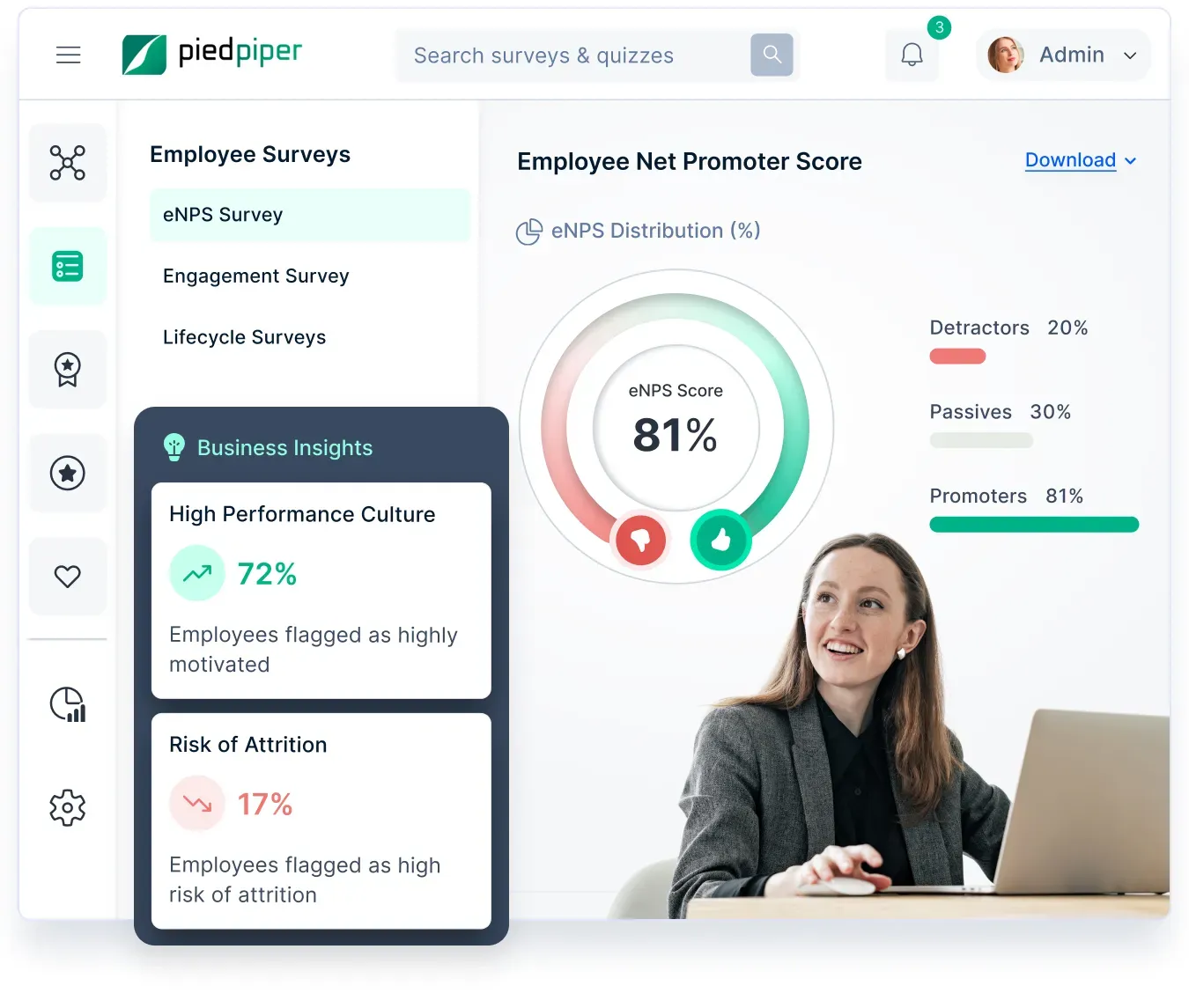
Digging deep into where engagement levels currently are with your managers and where you see plenty of room for improvement can allow you to tackle issues in a targeted way and measure your progress as you go.
Employee engagement tools for managers
Empuls is built not just to drive employee engagement—but to empower managers as culture carriers and productivity enablers. Below are the core tools and modules within Empuls that directly support and elevate manager engagement.
1. AI-powered personal recognition assistant (Em)
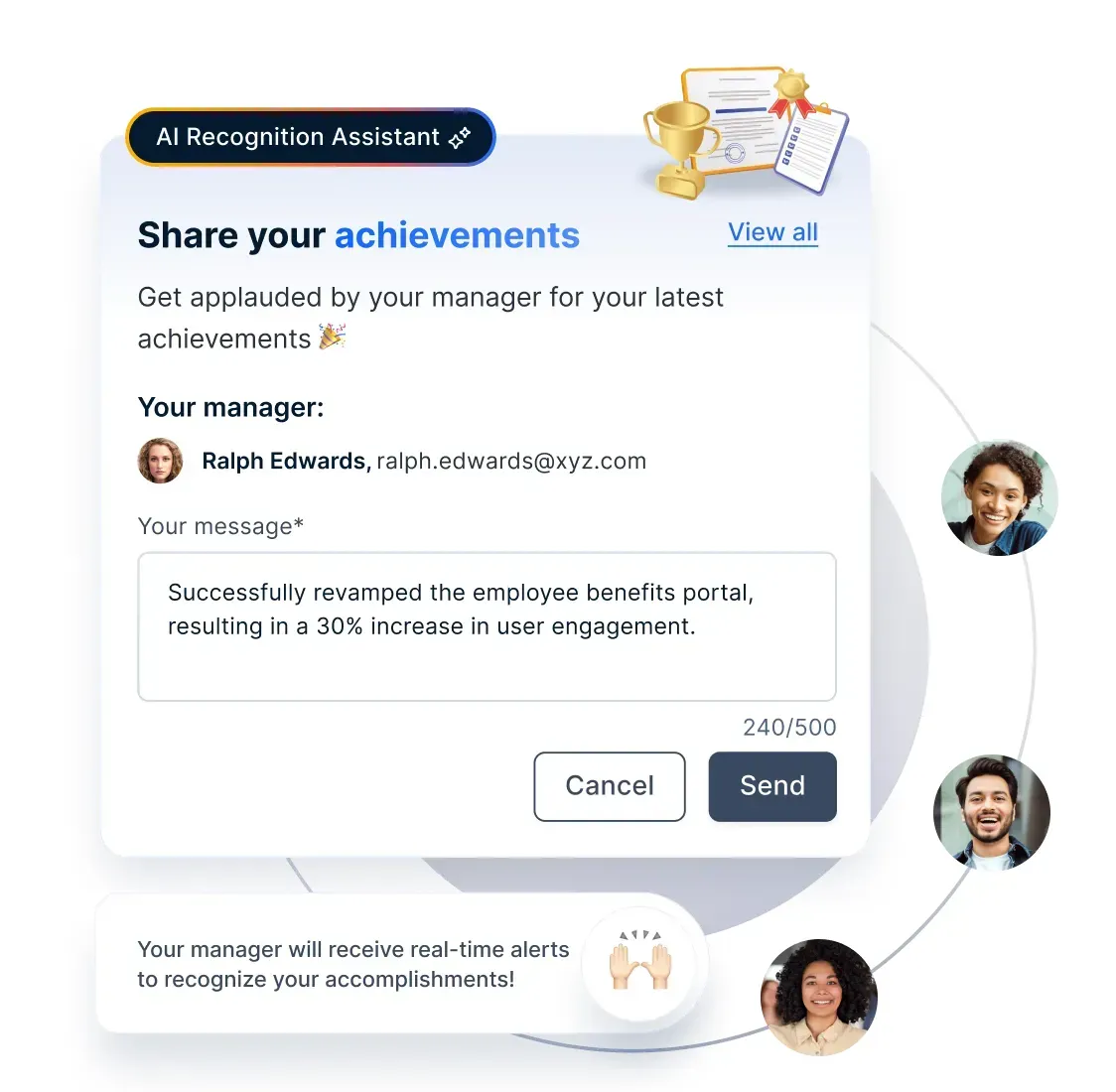
Em is Empuls’ intelligent AI bot that acts as a proactive coach and engagement guide for managers.
How it helps managers:
- Smart nudges: Em prompts managers to recognize team members by sharing weekly achievements.
- Recognition insights: Highlights employees who are frequently recognized—and those who aren’t—to guide inclusive acknowledgment.
- Event reminders: Notifies managers of upcoming birthdays, service anniversaries, and milestones.
2. People analytics & manager dashboards
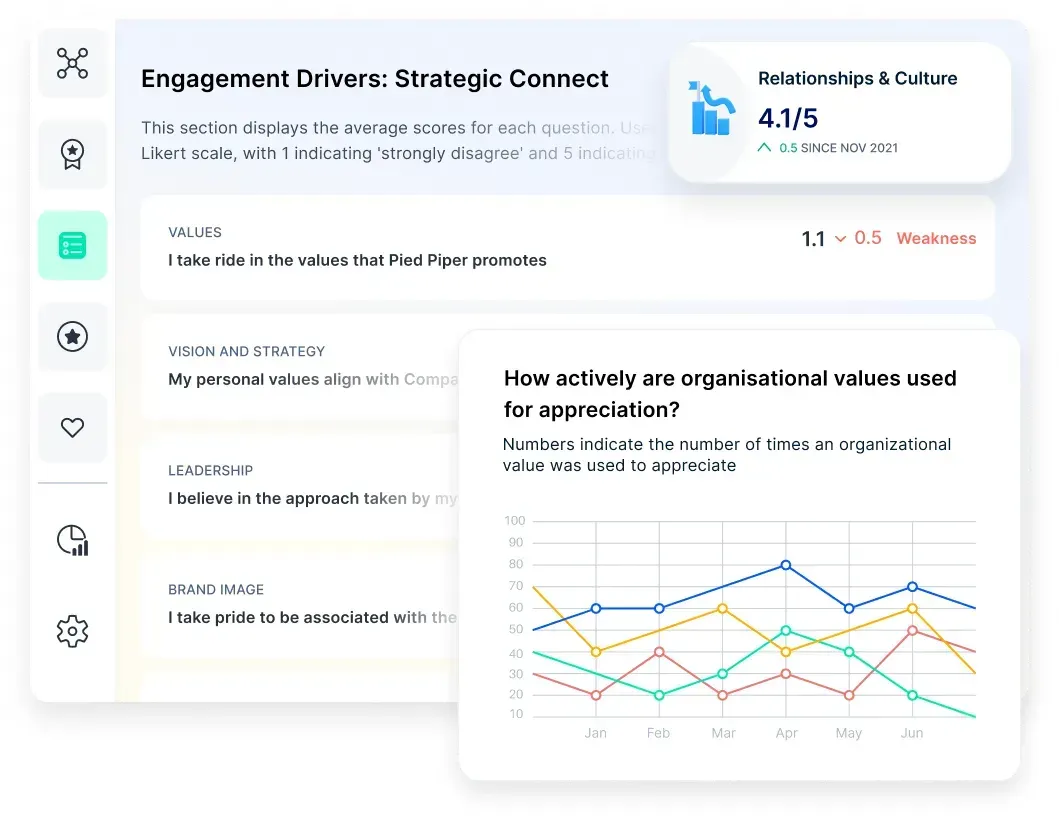
Empuls offers rich people analytics, giving managers data-driven insights on team engagement and participation.
Key Metrics Tracked:
- Recognition frequency
- Survey participation and scores
- Reward redemptions
- Peer-to-peer interaction patterns
How it helps managers:
- Identify disengagement patterns early
- Pinpoint top performers or at-risk team members
- Take real-time action with data-backed nudges
3. Employee feedback & survey tools
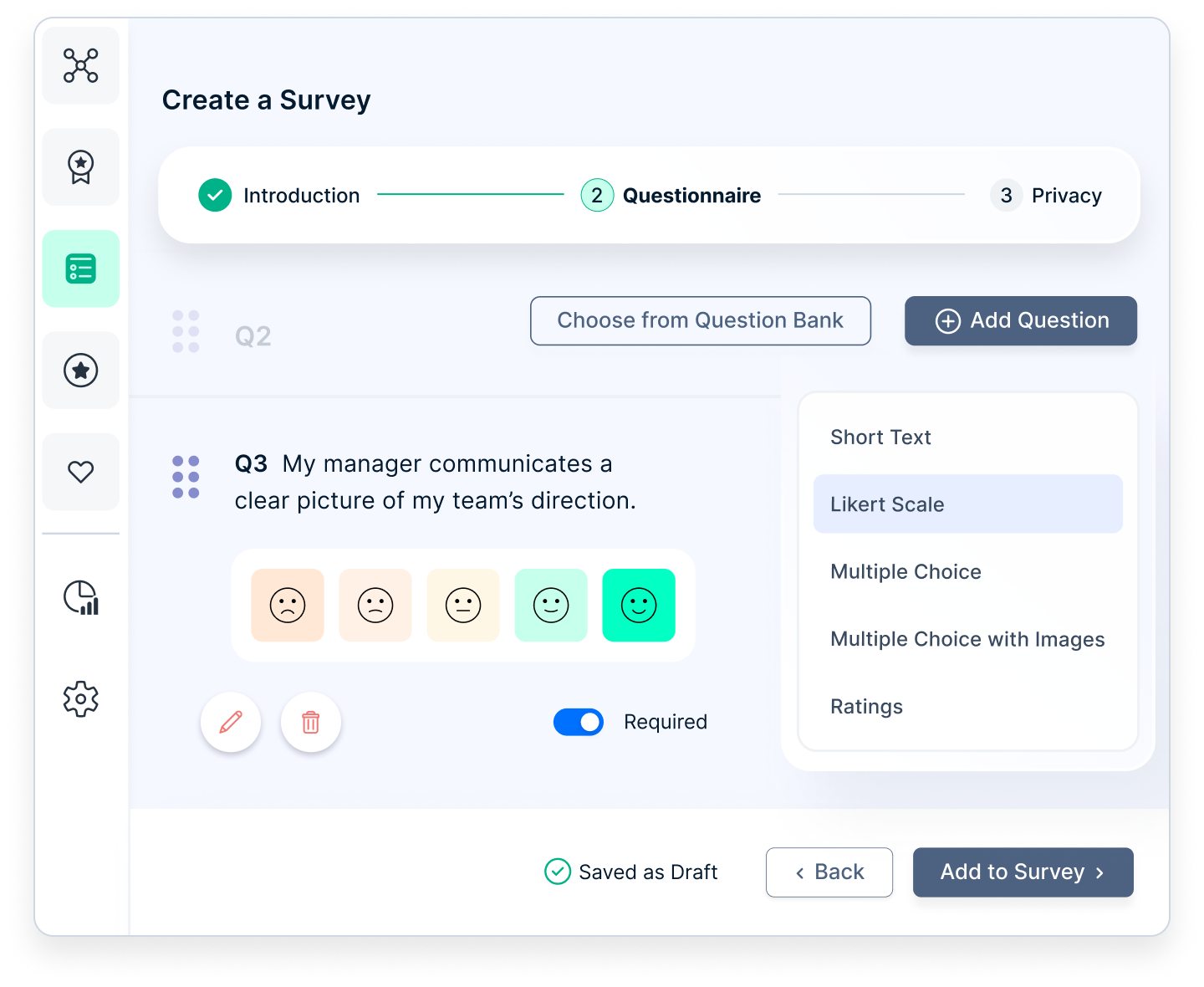
Empuls includes Pulse, eNPS, Lifecycle, and 360° feedback surveys.
How it helps managers:
- Segment results by team, function, or hierarchy to isolate issues
- Track feedback across the employee lifecycle (onboarding, role changes, exits)
- Access ready-to-use templates or create custom ones aligned to leadership effectiveness
4. Social intranet & communities
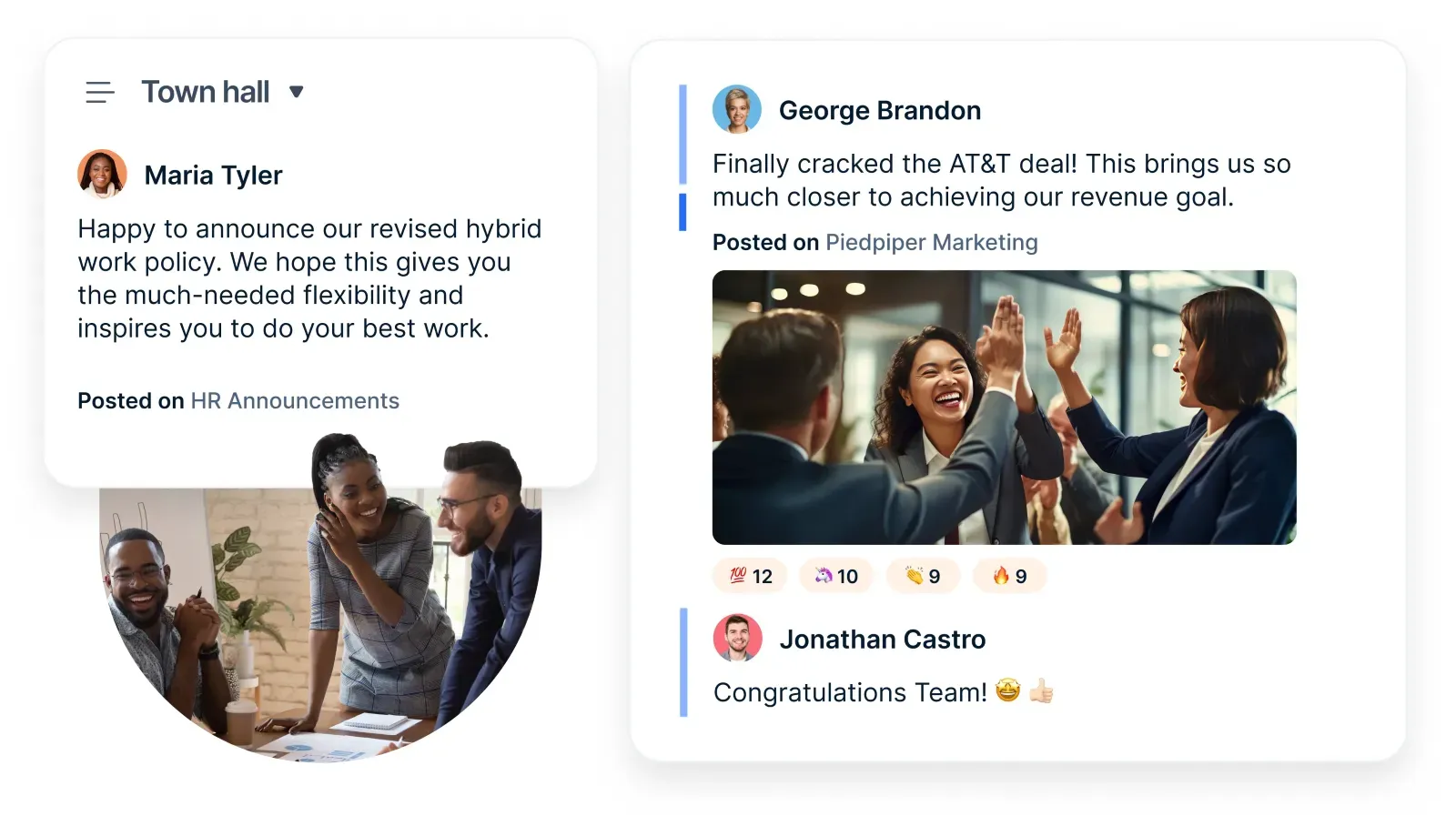
A vibrant internal communication hub that replaces scattered conversations with purposeful, transparent collaboration.
Tools for managers:
- Town halls: Share company or team-specific news.
- Polls & ask-me-anything (AMAs): Gather inputs in real-time or hold live Q&As with their teams.
- Celebration boards: Broadcast recognitions and milestones, boosting visibility and morale.
- Community groups: Managers can create interest or project-based groups to connect teams across silos.
5. Recognition & rewards automation
Empuls provides a complete recognition engine tailored for different managerial needs.
Managerial features:
- Spot awards & peer recognition: Empower managers to appreciate in-the-moment.
- Jury & nomination-based awards: Enable managers to run quarterly or annual awards.
- Automated milestone awards: Empuls ensures birthdays, work anniversaries, and accomplishments are never missed.
- Unified rewards dashboard: Managers can view all award data, set budgets, and track redemptions.
6. Perks & benefits for manager well-being
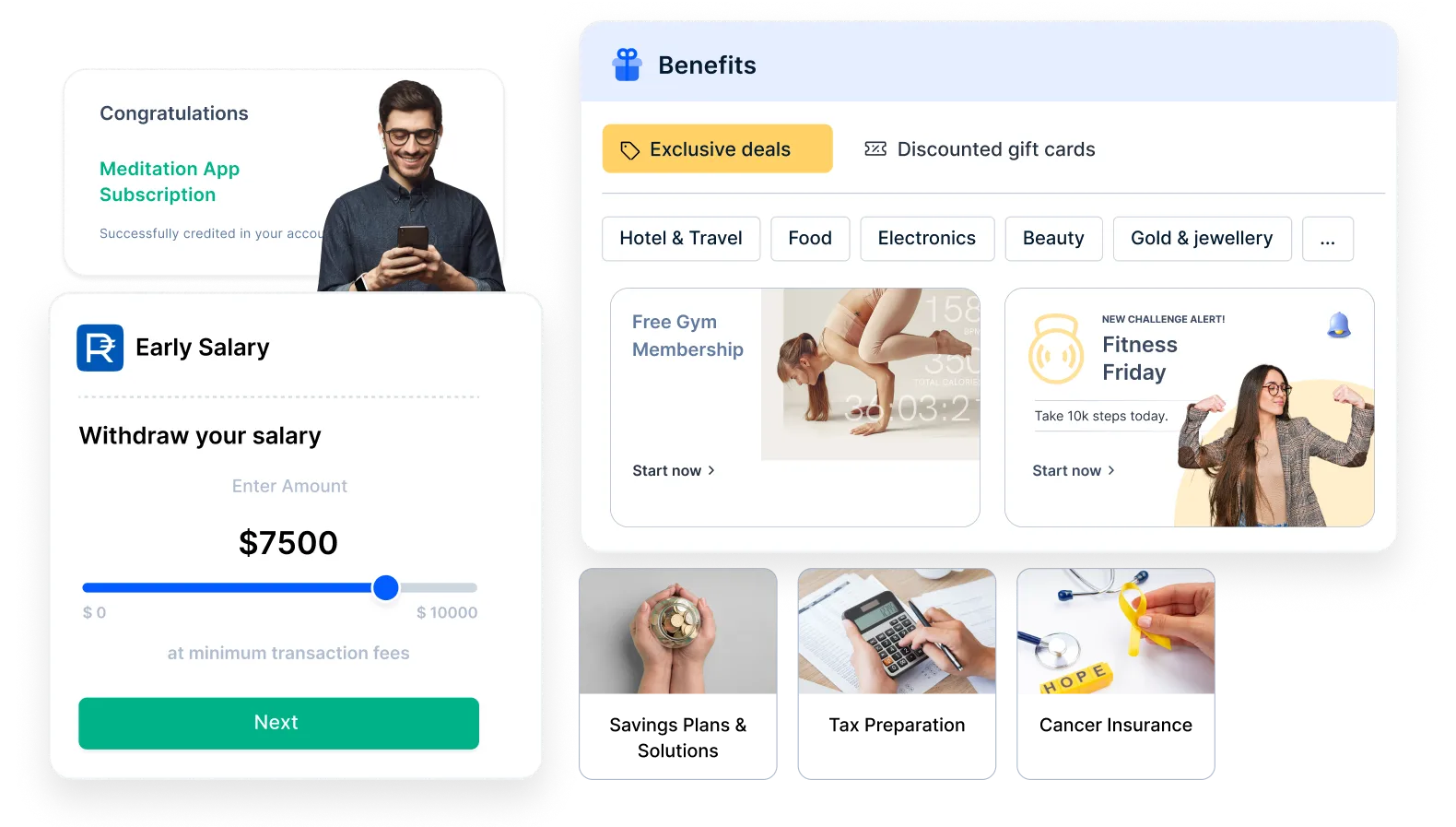
Empuls goes beyond engagement into the financial and emotional wellness space.
Manager benefits include:
- Flexible fringe benefits: Learning budgets, remote work allowances, wellness stipends, and more.
- Salary advances: Access to earned wages before payday.
- Perks store access: Cashback, gift cards, and offers from 6000+ brands in 50+ countries.
- Tax-saving benefits: Meal, fuel, books, and telecom reimbursements via multi-wallet cards.
With Empuls, managers don’t just use engagement tools—they own engagement outcomes. From nudges and dashboards to survey insights and personalized perks, Empuls empowers managers to:
- Lead with data and empathy
- Recognize in real-time
- Foster inclusive teams
- Elevate culture with automation
Schedule a call now to understand how Empuls can help your solution engage managers.
FAQ's
What are the 5 C's of Engagement?
- Connection – Foster strong relationships among peers and leaders.
- Clarity – Ensure clear expectations, goals, and communication.
- Contribution – Let employees see how their work impacts company success.
- Credibility – Build trust through consistent, transparent leadership.
- Confidence – Empower employees to make decisions and grow in their roles.
How to engage with your manager?
- Schedule regular 1:1s for feedback and check-ins.
- Share updates proactively on your progress and challenges.
- Seek input and involve them in decision-making when needed.
- Appreciate their efforts and recognize their support.
- Be solution-oriented, not just problem-focused.
How do you engage your supervisor?
- Align on goals and priorities. Understand what success looks like.
- Communicate openly and respectfully. Keep them in the loop.
- Take ownership of tasks to build trust and reliability.
- Give constructive feedback, when appropriate.
- Recognize their leadership and support their initiatives.


















